Exploring the Best Alternatives to Plastic Straws
Plastic straws provide convenience to our daily life, they are used for sipping beverages, including milk, coffee, cocktails, bubble tea, smoothies, and many others. With the increasing use of plastic straws, they are a significant contributor to plastic pollution. There are millions of straws ending up in landfills and oceans each day, causing serious environmental problems.
If plastic straws are buried deep underground, they take hundreds of years to decompose and release harmful chemicals. If they go into the ocean, they are easily eaten by marine life, which poses a huge threat to marine life. So, looking for alternatives to plastic straws are urgently needed.
Alternatives to Plastic Straws
Knowing which are the alternatives to plastic straws on the market will be better for you to choose the eco friendly straws.
Paper Straws
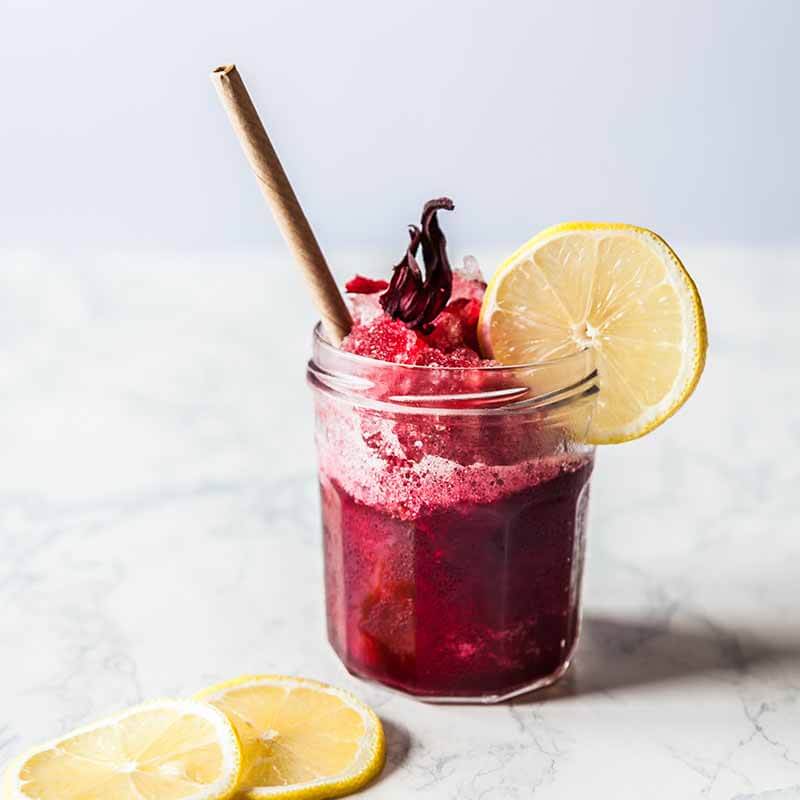
Pros
- Biodegradable: Paper straws are made from natural materials, which means they are biodegradable and can break down naturally in a short time. Does not like plastic straws which will persist in the environment for centuries.
- Lower Carbon Footprint: Producing eco friendly paper straws requires less energy and resources than plastic straws.
- Suitable for Single Use: Paper straws are designed for single use and can be customized in various colors and patterns, so they are great for events, parties, and themed restaurants.
Cons
- Durability: Paper drinking straws can only hold 2-3 hours if they contact with beverages. So, if you don’t finish your drink within this time, it will affect your drinking experience.
- Manufacturing Concerns: Not all the manufacturers follow sustainable standards, some of the paper straw manufacturers get the material from unsustainable tree resources and use certain chemicals.
Bamboo Straws
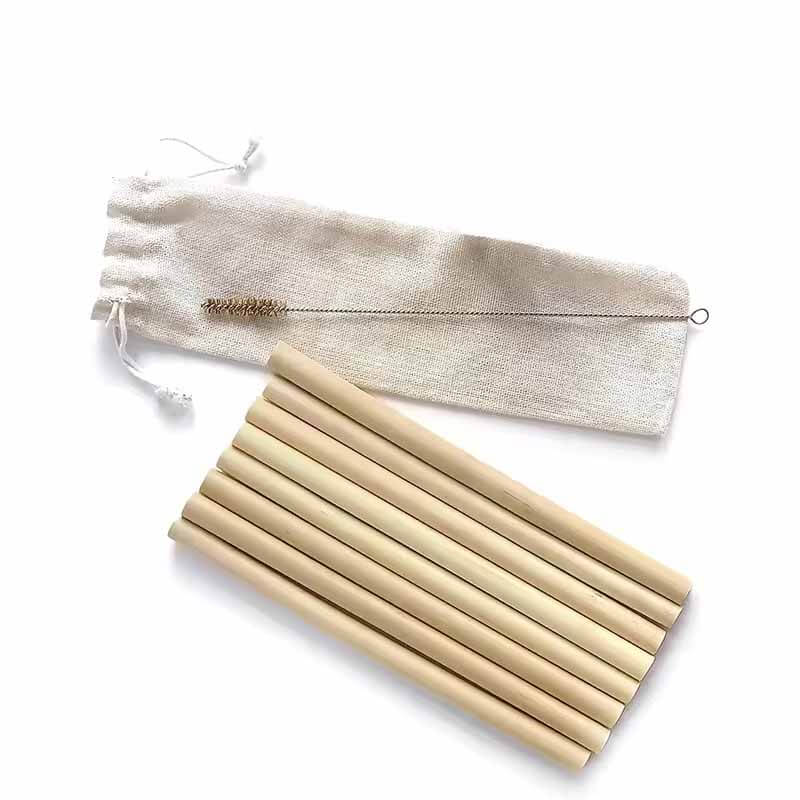
Pros
- Biodegradable and Renewable: Drinking straw made from bamboo is an eco friendly solution. This material is biodegradable and highly renewable.
- Durable and Reusable: Bamboo straws are sturdy to use, can be cleaned after use, and reused multiple times.
- Aesthetically Appealing: The appearance of the bamboo straw has the characteristics of bamboo, which brings a different drinking experience.
Cons
- Cleaning Challenges: Bamboo straws are not easy to clean thoroughly. If not properly maintained, mold is likely to grow.
- Limited Availability: Bamboo straws are not as widely used as paper straws, so consumers are unlikely to see these straws in all beverage stores.
- Sensitivity to Temperature: Too hot or too cold temperatures will cause the bamboo straws to crack or splinter. Therefore, you need to maintain it more carefully.
Stainless Steel Straws
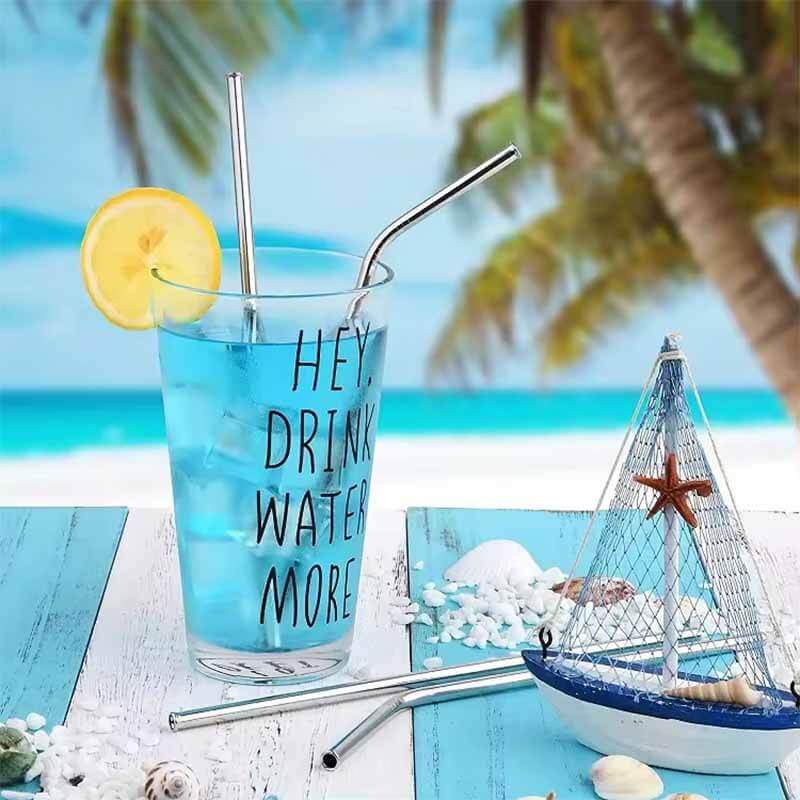
Pros
- Durability: Stainless steel straws are durable, resistant to corrosion, and suitable for both hot and cold beverages.
- Reusability: If properly maintained, this straw can last for several years. If you are not looking for single use straws, this is a good choice.
- Easy to Clean: Compared to bamboo straws, stainless steel straws are easy to clean, use a straw brush or place in the dishwasher to wash.
Cons
- Conducts Heat: If you are drinking hot beverages, the stainless steel straw will become hot and can easily hurt your mouth.
- Texture and Taste: Stainless steel straw is made of a type of metal, and some consumers don’t like the taste.
- Non-Biodegradable: This straw is reusable and not biodegradable. So if it’s not eligible for recycling, it’s going to end up in a landfill.
Glass Straws
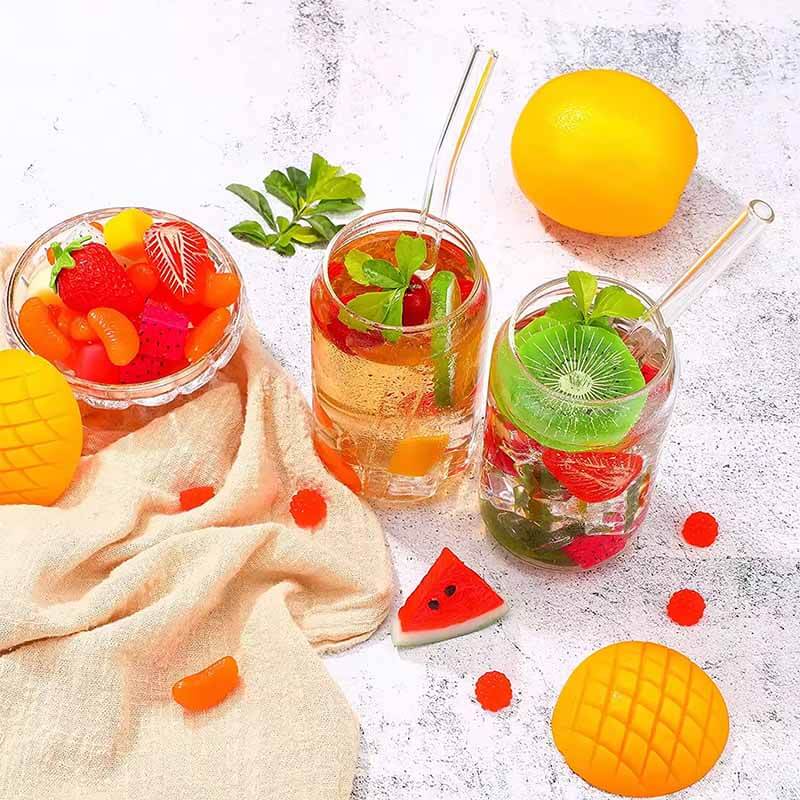
Pros
- Hygienic and Easy to Clean: Glass straws are visible inside and out, so they can be thoroughly cleaned, ensuring the hygiene of drinks.
- Transparency: Sipping different drinks through a glass straw will allow you to see different drinks passing through your straw, enhancing the drinking experience.
- Reusable: Glass straws are reusable straws, reducing the use of disposable straws is a great choice to protect the environment.
Cons
- Fragility: The drinking straw made of glass is easy to break if mishandled or dropped.
- Non-biodegradable: Glass straw is reusable, but not biodegradable. Therefore, when you do not need to use and discard it, please dispose of it properly for recycling. Otherwise, it will cause harm to the environment.
Silicone Straws
![]()
Pros
- Eco-Friendly: Reusable silicone straws are a great choice for eco friendly purposes if you do not want to use single use plastic straws.
- Durable: Silicone straws are very durable and flexible, so you don’t have to worry about them deforming. This material is also very wear-resistant.
- Safe for Teeth: Unlike metal straws, silicone straws are very friendly to teeth and gums. This straw is a very good choice for consumers who don’t like metal straws.
- BPA-Free: Use high-quality silicone straws that are BPA-free and do not have harmful substances leach into your beverages to harm your body.
- Wide Variety: Silicone straws can be provided in different sizes and colors to meet the needs of different application scenarios.
Cons
- Not Heat Resistant: Silicone straw is not suitable for drinking very hot beverages, since the straw surface will become too hot to touch.
- Cleaning Challenges: Due to the material being soft and flexible, the straw is not easy to clean thoroughly. If not cleaned, mold or bacteria may easily breed.
- Non-Biodegradable: Silicone straw is reusable, but not biodegradable. If it is not handled properly and does not meet the recycling conditions, it will be treated as waste.
- Texture Sensitivity: Same as the metal or glass straw, Some people don’t like metal or glass textures, while others don’t like silicone textures. This depends on different consumers.
Rice Straws
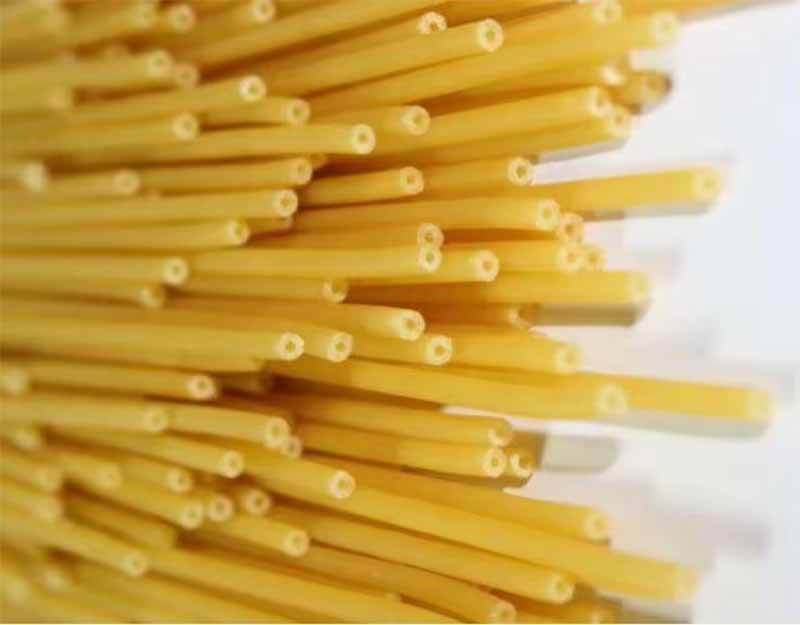
Pros
- Biodegradable: Rice straws are made from natural rice flour, so this straw is fully biodegradable and eco friendly.
- Edible: The advantage of the straw that is made from the rice is they are edible. Rice straws can be eaten with your drink or on their own.
- Minimal Flavor Impact: Rice straws may have a slightly grainy taste, which is very similar to your usual staple food, so it will not affect the taste of your drink.
Cons
- Limited Durability: Because of the raw materials and properties of rice straws, if left in a drink for too long, it will become soggy and start to break down.
- Limited Use for Hot Beverages: Due to the raw material, the rice straw can not hold too hot beverages.
Pasta Straws
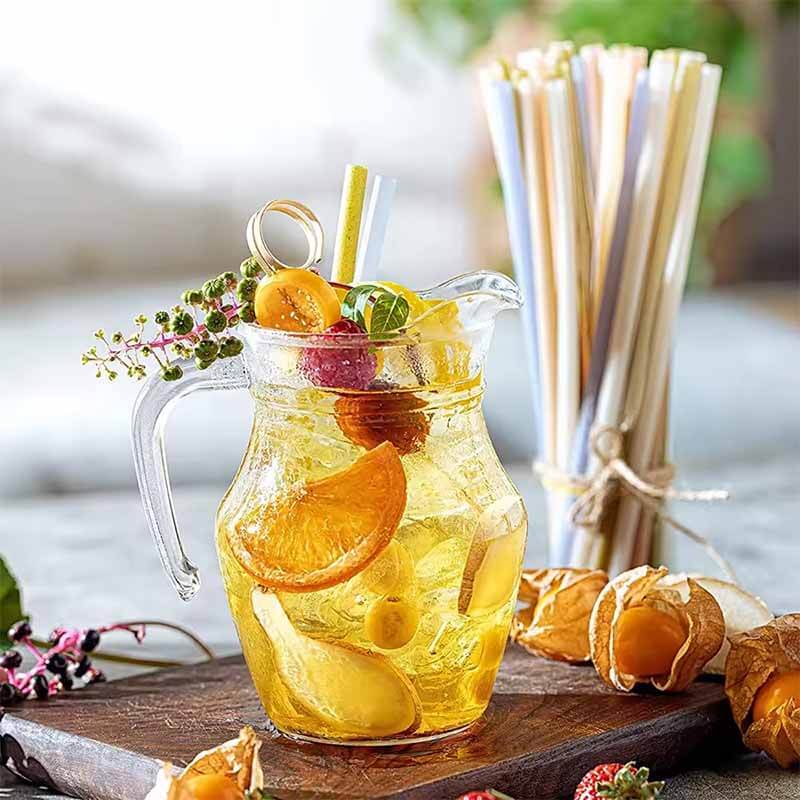
Pros
- Biodegradable: Pasta straws are made from wheat or rice flour, so this straw is fully biodegradable and compostable.
- Sturdy and Long-Lasting: Compared to rice straws, pasta straws, as one of the edible straws are sturdier than rice straw and can last longer in beverages.
- Variety of Shapes and Sizes: Can be made into various sizes and shapes to fit different drinks.
Cons
- Texture and Flavor: Some users have reported that they don’t like the taste of pasta straws. This is partly based on personal preference.
- Limited Use for Hot Beverages: Same as rice straw, pasta straw is also not an ideal drinking straw for very hot beverages.
Wheat Straws
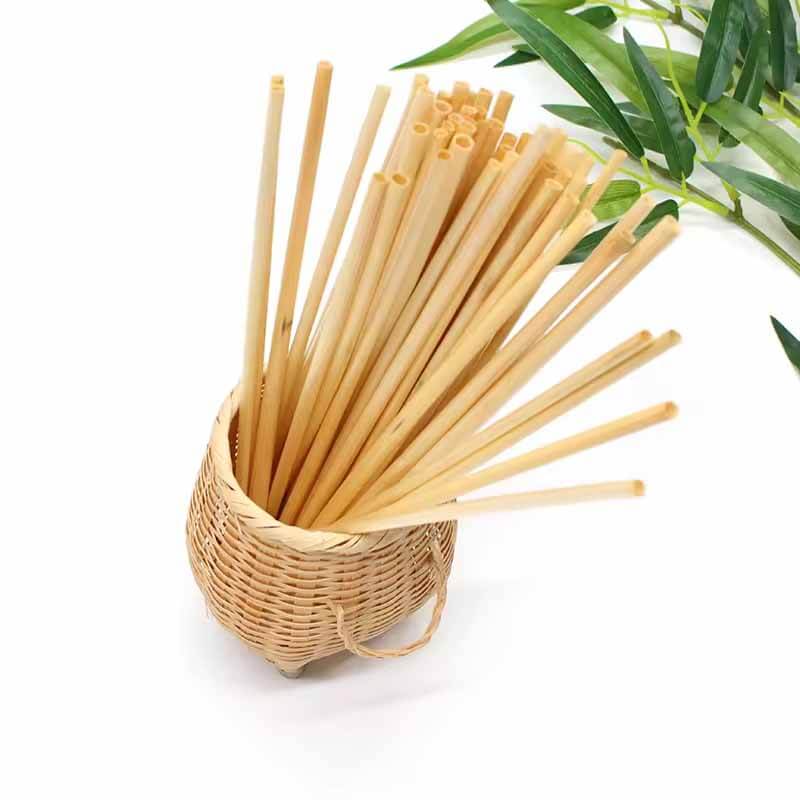
Pros
- Biodegradable: Wheat straws are made from natural wheat stems, a kind of fully biodegradable and compostable straws.
- Sturdy: Wheat straws are relatively sturdy and can hold up well in various beverages without getting too soft quickly.
- Waste Reduction: The raw material of wheat straw is an agricultural by-product, reducing the waste of resources.
Cons
- Texture and Taste: Based on personal preference, some consumers who are sensitive to taste do not like the taste of wheat straw.
- Limited Use for Hot Beverages: Not suitable for very hot beverages, easily softens or breaks down.
Cornstarch-Based Straws
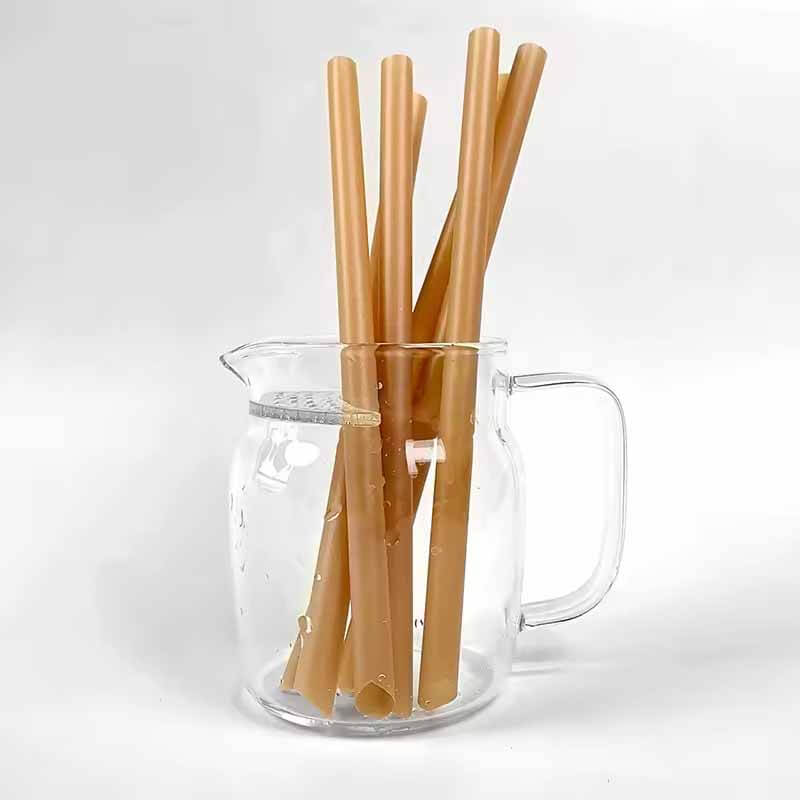
Pros
- Biodegradable: Cornstarch-based straws are made from renewable resources and are fully biodegradable, this is also a great alternative to plastic straws.
- Heat Resistant: These straws are generally more heat-resistant than some other plant-based options, making them suitable for warm beverages.
- Transparent Options: Cornstarch-based straws can be transparent, which makes a similar appearance to traditional plastic straws.
Cons
- Durability: The cornstarch-based straws are easy to break, especially when you are drinking hot or acidic beverages.
Factors to Consider When Choosing the Right Alternative
When choosing the right alternative to plastic straws, you can consider the following factors and make the decision that fits your needs.
Environmental Impact
Analyze the environmental impact of each alternative, and see which is the best option with biodegradable, compostable, and recyclable features. Choose the option that is environmentally friendly.
Durability and Reusability
Consider how long each alternative can last in the beverages and whether it can be reused multiple times or single use. Choose the straw that suits your application scenario.
Beverage Compatibility
Think about the types of beverages you frequently enjoy or the main beverages sold in your store. Some reusable drinking straws are suitable for individual use, and other single use drinking straws are suitable for use in the public restaurant.
Sensitivity to Temperature
This is based on personal preference or the type of drinks you sell in your store. If they are hot drinks, be especially careful when using straws that conduct heat.
Texture and Taste
Based on personal preferences or consumer preferences, choose the straw you like. Because some consumers don’t like the taste of metal, while some consumers prefer the texture of bamboo.
Portability
If you are choosing the right straw for your beverage store, check if you have many to-go orders. Choose the best-fit drinking straws that are easy to carry, and not easy to break.
Availability and Cost
Check the availability and cost of the alternatives in your area. For example, not all areas have adequate composting facilities and composting conditions.
John Q
John Q is Eco March’s Product Manager. With 5 years of prior experience in the food industry after graduating from university, he has been an integral part of Eco March. He excels in creating and developing eco-friendly food packaging products with a keen focus on enhancing the consumer experience.


